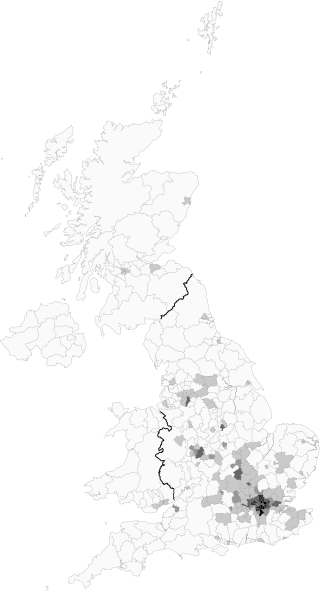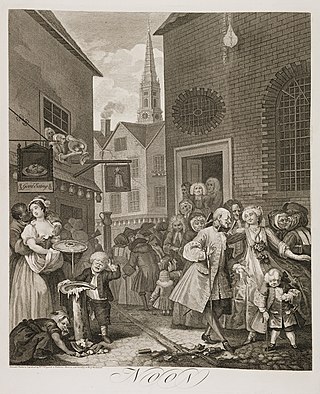100 Greatest Britons is a television series that was broadcast by the BBC in 2002. It was based on a television poll conducted to determine who the British people at that time considered the greatest Britons in history. The series included individual programmes featuring the top ten, with viewers having further opportunity to vote after each programme. It concluded with a debate and final determination of the ranking of the top ten. Although many living people were included among the top 100, all of the top ten were deceased.

Olaudah Equiano, known for most of his life as Gustavus Vassa, was a writer and abolitionist. According to his memoir, he was from the village of Essaka in modern southern Nigeria. Enslaved as a child in West Africa, he was shipped to the Caribbean and sold to a Royal Navy officer. He was sold twice more before purchasing his freedom in 1766.
Early modern Britain is the history of the island of Great Britain roughly corresponding to the 16th, 17th and 18th centuries. Major historical events in early modern British history include numerous wars, especially with France, along with the English Renaissance, the English Reformation and Scottish Reformation, the English Civil War, the Restoration of Charles II, the Glorious Revolution, the Treaty of Union, the Scottish Enlightenment and the formation and the collapse of the First British Empire.

In England and Wales, the Tudor period occurred between 1485 and 1603, including the Elizabethan era during the reign of Elizabeth I (1558–1603). The Tudor period coincides with the dynasty of the House of Tudor in England, which began with the reign of Henry VII. Under the Tudor dynasty, art, architecture, trade, exploration, and commerce flourished. Historian John Guy (1988) argued that "England was economically healthier, more expensive, and more optimistic under the Tudors" than at any time since the Roman occupation.

Black British people or Black Britons are a multi-ethnic group of British people of Sub-Saharan African or Afro-Caribbean descent. The term Black British developed during the 1960s, referring to Black British people from the former British West Indies, and from Africa.

British African-Caribbean people or British Afro-Caribbean people are an ethnic group in the United Kingdom. They are British citizens whose recent ancestors originate from the Caribbean, and further trace much of their ancestry to West and Central Africa or they are nationals of the Caribbean who reside in the UK. There are some self-identified Afro-Caribbean people who are multi-racial. The most common and traditional use of the term African-Caribbean community is in reference to groups of residents continuing aspects of Caribbean culture, customs and traditions in the UK.

Blackamoor is a type of figure and visual trope in European decorative art, typically found in works from the Early Modern period, depicting a man of sub-Saharan African descent, usually in clothing that suggests high status. Common examples of items and objects decorated in the blackamoor style include sculpture, jewellery, and furniture. Typically the sculpted figures carried something, such as candles or a tray. They were thus an exotic and lightweight variant for the "atlas" in architecture and decorative arts, especially popular in the Rococo period.

Ancient Aethiopia, first appears as a geographical term in classical documents in reference to the skin color of the inhabitants of the upper Nile in northern Sudan, of areas south of the Sahara, and of certain areas in Asia. Its earliest mention is in the works of Homer: twice in the Iliad, and three times in the Odyssey. The Greek historian Herodotus uses the appellation to refer to regions south of Egypt when describing "Aethiopians," indicating Nubia, not the modern nation of Ethiopia.

The history of African presence in London may extend back to the Roman period.

Slavery in Britain existed before the Roman occupation, which occurred from approximately AD 43 to AD 410, and the practice endured in various forms until the 11th century, during which the Norman conquest of England resulted in the gradual merger of the pre-conquest institution of slavery into serfdom in the midst of other economic upheavals. Given the widespread socio-political changes afterwards, all slaves were no longer recognised separately than other individuals in either English law or formal custom. By the middle of the 12th century, the institution of slavery as it had existed prior to the Norman conquest had fully disappeared, but other forms of unfree servitude continued for some centuries.

London, the capital of England and the United Kingdom, has become one of the most ethnically diverse and multicultural cities in the world.

Nubia is a region along the Nile river encompassing the confluence of the Blue and White Niles, and the area between the first cataract of the Nile or more strictly, Al Dabbah. It was the seat of one of the earliest civilizations of ancient Africa, the Kerma culture, which lasted from around 2500 BC until its conquest by the New Kingdom of Egypt under Pharaoh Thutmose I around 1500 BC, whose heirs ruled most of Nubia for the next 400 years. Nubia was home to several empires, most prominently the Kingdom of Kush, which conquered Egypt in the eighth century BC during the reign of Piye and ruled the country as its 25th Dynasty.
Onyeka Nubia is a British historian, author and academic. Using the pen name Onyeka, his works explore the history of Black British people, and multiculturalism in the United Kingdom. In 2013, he published the non-fiction work Blackamoores: Africans in Tudor England, their Presence, Status and Origins, which detailed the history of Black people in Tudor England. Blackamoores formed the basis of Onyeka's PhD by publication awarded by the University of East Anglia in 2016.

John Blanke was a musician of African descent in London from the early Tudor period, who probably came to England as one of the African attendants of Catherine of Aragon in 1501. He is one of the earliest recorded black people in what is now the United Kingdom after the Roman period. His name may refer to his skin colour, derived either from the word "black" or possibly from the French word "blanc", meaning white.
Marika Sherwood is a Hungarian-born historian, researcher, educator and author based in England. She is a co-founder of the Black and Asian Studies Association.

Casper Van Senden was a German merchant who was active in Tudor-era England during the 16th century. Born in the German city of Lübeck, he eventually moved to the English capital of London, a major port at the time. Working as a merchant in Hanseatic League, he rose to prominence in 1596 by ensuring the safe return of 89 English subjects who were detained in the Iberian Union. This brought Van Senden to the attention of Queen Elizabeth I, as he entered her court to seek compensation.
Patrick Philip Vernon is a British social commentator and political activist of Jamaican heritage, who works in the voluntary and public sector. He is a former Labour councillor in the London Borough of Hackney. His career has been involved with developing and managing health and social care services, including mental health, public health, regeneration and employment projects. Also a film maker and amateur cultural historian, he runs his own social enterprise promoting the history of diverse communities, as founder of Every Generation and the "100 Great Black Britons" campaign. He is also an expert on African and Caribbean genealogy in the UK. He was appointed a Clore Fellow in 2007, an Officer of the Order of the British Empire (OBE) in the 2012 Birthday Honours for "services to the Reduction of Health Inequalities for Ethnic Minorities", and in 2018 was awarded an honorary doctorate from the University of Wolverhampton.

Ellen or Elen More was an African servant at the Scottish royal court. She probably arrived in Scotland in the company of a Portuguese man with imported animals. There are records of clothing and gifts given to her, although her roles and status are unclear. Some recent scholarship suggests she was enslaved, and her arrival in Scotland can be linked indirectly with the slave trade. She is associated with a racist poem by William Dunbar, and may have performed in Edinburgh as the "Black Lady" at royal tournaments in 1507 and 1508.

Henry or Henrie Anthonie Jetto was a black English yeoman, the earliest-known black person with an extant will in England and the earliest to have resided in Worcestershire.

A number of people of African origin were recorded as servants at the Royal Court of Scotland during the 16th-century, forming a notable African presence at the Scottish royal court. The accounts include gifts of clothing. The American scholar Kim F. Hall has characterised these people as "dehumanised alien curiosities", and their histories, roles at court, and their relationships with communities, are the subject of continuing research and debate.















